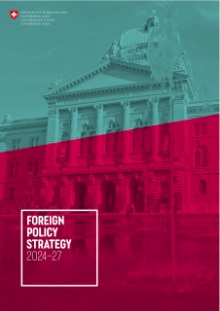- Home
- FDFA
- Publications
- All publications
Search and filter
Publications: 81
-

Foreign Policy Strategy 2024–27
At the beginning of each legislative period, the Federal Council presents a foreign policy strategy which provides the central guidelines for Switzerland's foreign policy for four years and sets out priorities and objectives. It serves as a compass in a volatile world.
-

Mine Action: Action Plan 2023-2026
With the new Action Plan Switzerland is carrying forward its long-standing commitment in this area. The action plan focuses not only on implementation of the relevant conventions and support for the clearance of contaminated areas, but also on innovative approaches. In addition, Switzerland will provide targeted support to Ukraine in the coming years.
-

South East Asia Strategy 2023-2026
For the first time, the Federal Council has adopted a regional strategy concerning the countries of South East Asia. The strategy is intended to broaden Switzerland's relations with the region and to coherently harness the many opportunities offered by the overall growth of the Asia-Pacific. It complements the China Strategy that the Federal Council approved in 2021.
-

Swiss Peace Supporter 4/2022
Global peace is increasingly threatened by environmental risks. This edition of SPS is therefore focusing on options for action identified from SIPRI's Environment of Peace report, two experts reporting on women in water diplomacy in Central Asia, and climate induced migration in East Africa. You can also find out more about the UN's day-to-day work in Iraq.
-

Swiss Peace Supporter 2/2022
This issue focuses on the Middle East. We bring you coverage of the first Swiss national to be appointed head of the UNTSO peacekeeping mission, and discuss Switzerland's engagement in Syria and Lebanon. You can also read reports on the evacuation from Kyiv and on the CIVPOL mission in Mali, as well as a special article on the importance of justice and law enforcement in peace support.
-

Americas Strategy 2022–2025
This report, which was approved by the Federal Council on 16 February 2021, is a geographical follow-up strategy to the Foreign Policy Strategy 2020–23 (FPS 20–23). The approval of the Americas Strategy 2022–25 is one of the measures taken by the Federal Council in meeting its annual objectives for 2021.
-

Swiss Peace Supporter 1/2022
This issue highlights the 'return on investment' of peace operations, i.e. their personal and institutional added value. An assignment at the UN in New York, for example, gave a colleague important impulses for his work in Sri Lanka. Other topics include the conflict in Cameroon in the context of the Africa Cup, a Moscow exhibition on gulags, and a look back at a long FDFA career in peacebuilding.
-

Swiss Peace Supporter 4/2021
The last issue of the Swiss Peace Supporter in 2021 focuses on the Western Balkans, where the largest Swiss military contingents are deployed. Switzerland's civilian peace support comprises inclusive dialogue platforms (p. 10) and support for the Kosovo Specialist Chambers (p. 18). Don't miss our articles on the UN's fight against human trafficking and on disaster-induced migration in East Africa.
-

Flyer - Peace and Human Rights Division
Flyer with a short presentation of the activities of the Peace and Human Rights Division (FDFA, State Secretariat)
-

Swiss Peace Supporter 3/2021
By combining conflict management and the promotion of democracy, Switzerland believes it can be an agent for change. For example, it aims to reinforce democratic processes by promoting free and fair elections and supporting freedom of expression in the digital space. The reports from eastern Ukraine, Kashmir and the UN headquarters in New York (on children and armed conflict) are also well worth a read.
-

Swiss Peace Supporter 2/2021
The SPS 2/2021 is devoted to the further development of military peace support and how the latter is adapting to future requirements. It also discusses the efforts to integrate women into the militia army after their deployment abroad. This edition’s Special also looks at promoting human rights standards for private security companies. Finally, a colleague reports on his daily life in Myanmar.
-

China Strategy 2021-2024
This report was approved by the Federal Council on 19 March 2021. It is a geographical follow-up strategy to the Foreign Policy Strategy 2020–23 (FPS 2020–23) . In accordance with objective 6.4 of the FPS 2020–23, Switzerland has updated its China Strategy and is setting up interdepartmental coordinating bodies to improve coherence. The report also responds to the postulate of the National Council Foreign Affairs Committee FAC-N (20.4334 ) and the Nidegger motion (20.3738).
Last update 26.01.2022
